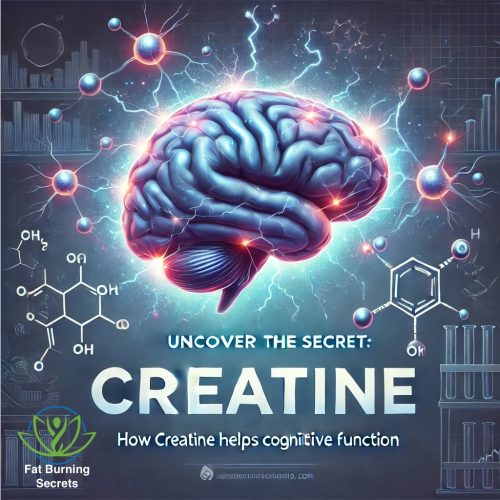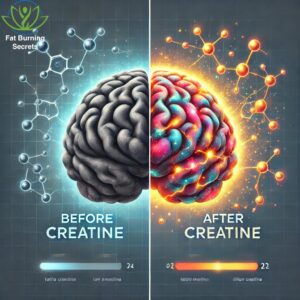
Can you recall the last time you walked into your kitchen and forgot what for? Or perhaps a time when you struggled to remember the name of an old-time favorite movie? If you nodded in agreement, you might be one of many who are concerned about cognitive decline. The good news is there’s something you can do about it! In this blog post, we explore the potential benefits of “creatine for brain function.” It’s about time we restored the power of your brain!
Creatine, a natural substance found predominantly in our muscles, has begun to shake the world of neuroscience. Recent research suggests that this magic molecule may play a significant role in enhancing our cognitive abilities. But how? Let’s delve deeper.
Creatine is an organic compound that our bodies naturally produce, and it’s also found in foods like red meat and seafood. It’s well-known for its role in providing energy to our muscles, which is why it’s a popular supplement among athletes. However, its role extends beyond muscles; it is equally important for brain function. The brain is an energy-demanding organ, using up to 20% of the body’s energy. Creatine aids in the formation of ATP (adenosine triphosphate), the primary energy currency in the brain, which is crucial for maintaining optimal brain function.

It might come as a surprise to you that half of the creatine in our bodies comes from the brain. That does hint towards its vital role, doesn’t it? Scientific studies suggest that creatine plays an essential part in our brain’s energy metabolism. It contributes to forming ATP, which is critical for cellular processes and neural signaling.
In a 2003 study by Rae et al., researchers found that oral creatine supplementation significantly improved memory and intelligence scores among vegetarian individuals. This study highlighted the potential of creatine in enhancing cognitive abilities, particularly in populations with lower baseline creatine levels. The increase in brain creatine levels was associated with improved cognitive performance, emphasizing the importance of energy availability for mental processes.
Have you wondered why we sometimes struggle to recall the smallest of things? The reason is that our brains are energy-hungry. When there’s a dip in energy, cognitive functions like memory retaining can be obscured. That’s where creatine comes to the rescue. By fueling the brain with necessary ATP, creatine boosts memory function, allowing you to enjoy your favorite moments without forgetting the smallest details!
A study by McMorris et al. (2007) demonstrated that creatine supplementation improved short-term memory and cognitive performance in tasks requiring quick thinking and reaction times in elderly people. These findings suggest that creatine can be particularly beneficial in situations where cognitive demand is high, such as during exams or when multitasking.
While there have been mixed results, a notable study by Rae et al. (2003) exhibited that oral creatine supplementation led to significantly improved memory and intelligence scores amongst individuals. It might be promising to see more research unveiling creatine’s potential in combating cognitive decline.
A meta-analysis conducted by Avgerinos et al. (2018) reviewed several studies on creatine supplementation and cognitive function. The analysis concluded that creatine has a positive impact on cognitive performance, particularly in tasks that require speed of processing and working memory. However, the authors noted that more research is needed to understand the long-term effects of creatine on cognitive health.
1. Can creatine supplementation benefit everyone?
Creatine supplementation can benefit individuals with low dietary creatine intake or those under high cognitive demand. However, its effects may vary depending on individual differences such as diet, age, and baseline cognitive function.
2. Are there side effects of creatine?
Creatine is generally considered safe when used as directed. Some individuals may experience minor side effects like bloating or gastrointestinal discomfort. It’s essential to consult a healthcare professional before starting supplementation.
3. How much creatine should I take for brain health?
The typical dosage for cognitive benefits ranges from 3 to 5 grams per day. It’s crucial to follow recommended guidelines and consult with a healthcare provider to determine the appropriate dosage for your specific needs.
Creatine for brain function isn’t a mere buzzword in the neuroscience landscape. It promises an exciting potential in boosting memory, sustaining brain energy levels, and fighting cognitive decline. Research indicates that creatine supplementation can enhance cognitive performance, particularly in tasks requiring quick thinking and memory retention.
Are you ready to nourish your brain and enjoy the enhanced cognitive function? Enrich your diet with adequate creatine and keep cognitive decline at bay. But remember, every brain is unique. It’s essential to consult a healthcare professional before you start any new regimen.
As more studies emerge, we may continue to uncover the profound impact of creatine on cognitive health. Whether you’re a student, a busy professional, or someone looking to maintain mental sharpness, creatine could be a valuable addition to your wellness routine.
Learn more about the power of your brain in my post What is the Placebo Effect?
– Creatine plays a vital role in brain energy metabolism.
– Creatine has potential benefits in boosting memory function.
– Some studies suggest that creatine supplementation can improve cognitive health.
Richard H. Webb, author of Fat Burning Secrets, is a seasoned amateur bodybuilder with over a decade of competition experience. His track record speaks for itself—every time he’s stepped onto the famed Muscle Beach stage in Venice, California, he’s walked away with a first-place win in his division.
Now, at 62 years young, Richard continues to defy age-related limits, maintaining an impressive 12-15% body fat year-round. For him, age isn’t an excuse—it’s a challenge to conquer.
In Fat Burning Secrets, he reveals the game-changing workout and nutrition strategies that helped him cut his weekly training time by 12+ hours—without sacrificing results. Whether you're looking to burn fat, build muscle, or reclaim your energy, this book lays out the proven, time-efficient system that has kept him competition-ready for years.
